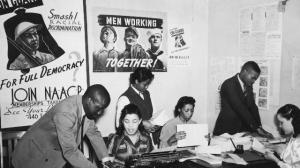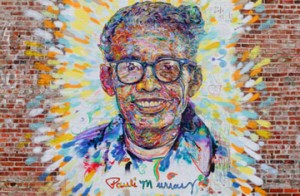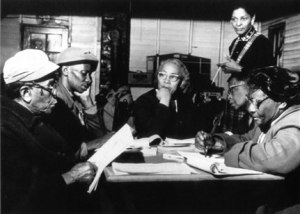The Civil Rights movement illustrates one of the greatest collective demonstrations of insurgency in American history. Its success required fearless leadership and social activism far beyond the most famous figures like Martin Luther King Jr., Malcom X and Rosa Parks. Carolina Women of Civil Rights aims to highlight African American female leaders of North and South Carolina who made great contributions to the overall success of the movement. Ella Baker, Pauli Murray and Septima Clark played very different roles in the Civil Rights movement, but they shared similarities in their passion for social justice, racial & gender equality and community-based leadership. Through their unique positions as both African Americans and women, the stories of Baker, Murray and Clark provide an important perspective on the Civil Rights movement often overshadowed by the mainstream telling of events. Their involvement in education, organization and community leadership exemplified key strengths of leadership each of these women shared.
As Educators – Each of these women utilized education to advance their own positions as leaders, and to empower others. Black females were still barred from many professional opportunities in the 1960’s, so education provided a central means of advancement. Baker attended and partook in student activism at Shaw University, which helped inspire her lifelong passion for empowering young people to enact social change through SNCC. Murray took education to an astounding level by earning 7 degrees and then continuing her commitment to learning by incorporating education into her career. She served as vice president at Benedict College and as a Professor of Law and Politics at Brandeis University. Clark devoted her life to education, first by learning and teaching in Charleston, SC and then dedicating herself to educating at the Highlander School in Tennessee and founding citizenship schools throughout the South.

Ella Baker at a New York branch of the NAACP office in 1943, where she served as organizational director.
As Organizers – These women exhibited a trait common to many black female leaders: integral work as behind-the-scenes organizers in their respective organizations. Rather than the traditional, authoritative leadership often exemplified by black male leaders in the movement, women significantly contributed by coordinating day-to-day logistics and networking. Baker served in key organizational positions at the NAACP and the SCLC, and used this skillset for the birth and success of SNCC. Murray was an organizer for the Civil Rights movement by working behind-the-scenes to contribute academic and legal insight as well as demonstrating insurgent actions to protest discrimination. In the women’s movement she was one of the founders of National Organization for Women and implemented a women’s agenda in the ACLU. Clark made key strides in mobilizing adult literacy and voter education across the South, through her organization of the citizenship schools and Voter Education Project.

Murals organized by the Pauli Murray Project commemorate her role as an activist and her contributions to the community.
As Community Leaders – Baker, Murray and Clark each share a passion for community-based leadership. These women inspired those around them to become their own leaders of social change, far from the authoritative style of leadership many black male leaders exhibited like Dr. Martin Luther King, Jr. Baker founded SNCC with the hope to empower young people to become leaders of social justice themselves and inspire this next generation. Murray used her law degree to help unfairly oppressed members of the community. She also forged alliances between the women’s and Civil Rights movements, facilitating dialogue between the two minority communities. Clark worked tirelessly through the Highlander and citizenship schools to empower Southerners to become responsible citizens and lead their own community programs.
To learn more about each of these incredible women leaders, please visit their individual pages on this site.

